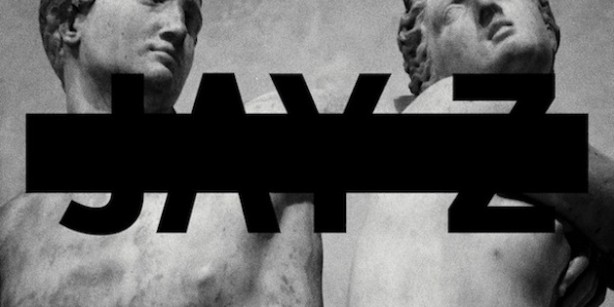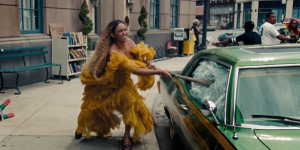 Music
Music
TRENDSPOTTING: The main marketing event
by Richard Trapunski
July 18, 2013
Over-the-top stunt campaigns aren’t just being used to sell a product; in many cases, they are the product
Early this year, out-of-nowhere comebacks by legendary musicians like David Bowie and My Bloody Valentine made me wonder if, in the all-access, multi-platform 2013 media machine, the most effective hype is actually silence. In the months that have followed, 2013’s biggest releases have instead taken the opposite path. Boards of Canada hijacked Record Store Day for their own blog-baiting scavenger hunt; Daft Punk stole the Coachella spotlight with nothing but a commercial; Kanye West projected his face onto buildings across North America (to the chagrin of the police); and Jay-Z released an album that basically doubles as a tie-in Samsung ad campaign. Rather than going quiet, publicity machines have kicked into overdrive.
The breakdown of old industry models has opened avenues for artists to get creative with how they make and release music, but out-of-the-box innovation is overwhelmingly coming from the marketing and publicity side. I’m not naïve enough to think that this is any sort of new phenomenon. Music has been inseparable from marketing since the very beginning, and even the bands we’ve been trained to think of as anti-establishment have been some of the deftest players in the game. But now over-the-top stunt campaigns aren’t just being used to sell a product; in many cases, they are the product.
There’s no better example than Jay-Z’s Magna Carta… Holy Grail. Jay-Z has never made any qualms about his overt commercial intentions. Talking about Jay-Z in 2013 rarely means talking about rap music. It’s all synergy, brand image, actionable leverage, and proactive paradigms, which makes it nearly impossible to approach MCHG as a piece of art. Even if it didn’t sound so phoned-in—Jay’s alt-rock referencing rhymes mere window dressing to the all-star cast of guest stars and producers—the music would at best be an afterthought to its release strategy.
Before releasing the album, Jay-Z sold a million copies to Samsung (for a generous seven figures up front), giving Galaxy S III, Galaxy S4, and Galaxy Note II owners the exclusive first listen a week before its official release date. This was all part of an even bigger plan to game the system, essentially propelling MCHG to platinum status the exact moment it’s released. Billboard put the kibosh on that scheme, but only because it was executed too quickly for the music biz record keeper to change its rules. The next Hovesque tie-in campaign may well shoot straight to number one, just as the already-forgotten “Harlem Shake” did when the Hot 100 chart was altered to include YouTube and Vevo streams. Jay-Z was just as modest as usual about it, tweet-gloating: “If 1 Million records gets SOLD and billboard doesnt report it, did it happen? Ha. #newrules” [sic, sic, sic, etc.]
He’s right that he’s setting a precedent, but it’s not the utopian vision he suggests. In fact, it could open the doors for more shameless business-first music campaigns on a scale like his, where the actual quality of the music is basically inconsequential. Jay-Z doesn’t have to care about the reviews of his album. Even if it isn’t pre-platinum as planned, the money is already in his pocket and on its way into some NBA signing bonus.
The proximity of Magna Carta… Holy Grail’s release to Yeezus, the new one from fellow Throne-sitter Kanye West, has caused many critics to draw a sharp line between Jay-Z as business mogul and Kanye as boundary-pushing artiste. There is some truth to that – Yeezus is one of the most beautifully ugly albums to sit atop the charts – but Kanye is just as susceptible to the #newrules as his once-mentor.
Sure, Ye’s architectural canvas and lack of promo singles (unless you count his Saturday Night Live performance) have a much more subversive tone than Jay-Z’s campaign, but the careful release of pre-Yeezus info suggested an album-length critique of race and celebrity. Yes, it’s there in songs like “New Slaves,” but it’s more often used as a clumsy, loaded metaphor for his own relationship angst, and Kanye’s partner Kim Kardashian is as much a brand as Jay-Z.
It’s these stunts that create event albums, a distinction that’s becoming rarer in the splintering monoculture of crumbling labels and the Bandcamp playing field. Ironically, that magic everyone-listening-at-the-same-time feeling is elicited most effectively when the careful publicity campaigns collapse and albums end up online. Daft Punk’s team tried desperately to control the slow tease of information, but they couldn’t stop “Get Lucky” from leaking early.
Jay-Z, on the other hand, must have known his album would end up online the minute it was delivered to phones. In essence, he sold the right to the tech company to leak it themselves. That first listen may have transcended their devices, but it kept the word “Samsung” on the lips of every Jay-Z fan that wanted an early taste. Even without the Billboard scheme, Magna Carta… Holy Grail is still expected to top the charts. Those are the new rules.
Tags: Music, News, Jay-Z, Kanye West, Yeezus





